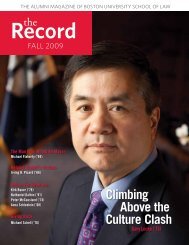the nature of representation: the cherokee right ... - Boston University
the nature of representation: the cherokee right ... - Boston University
the nature of representation: the cherokee right ... - Boston University
You also want an ePaper? Increase the reach of your titles
YUMPU automatically turns print PDFs into web optimized ePapers that Google loves.
126 PUBLIC INTEREST LAW JOURNAL [Vol. 15<br />
The Confederate Treaty’s repetition <strong>of</strong> <strong>the</strong> delegate provision is significant<br />
because <strong>of</strong> <strong>the</strong> new role <strong>the</strong> Cherokees played in <strong>the</strong> negotiations leading up to <strong>the</strong><br />
Treaty. The Cherokees for <strong>the</strong> first time had sufficient power to help determine <strong>the</strong><br />
shape <strong>of</strong> <strong>the</strong> Treaty:<br />
Never before had <strong>the</strong>y been in a position to do anything more than accept what<br />
was <strong>of</strong>fered <strong>the</strong>m. Their services were sorely needed by <strong>the</strong> Confederacy and<br />
<strong>the</strong> diplomatic Cherokees were not slow to take advantage <strong>of</strong> <strong>the</strong>ir opportunity<br />
and make <strong>the</strong> best <strong>of</strong> <strong>the</strong> situation. The treaty seems to represent what <strong>the</strong>y<br />
considered an ideal relationship. 173<br />
With <strong>the</strong> Confederate Treaty negotiations, “[f]or a brief period <strong>the</strong> white man had<br />
thrown aside <strong>the</strong> role <strong>of</strong> superiority which he had assumed in his previous relations<br />
with <strong>the</strong> Indians.” 174<br />
John Ross’s discussion <strong>of</strong> <strong>the</strong> Confederate Treaty’s delegate <strong>right</strong> in his 1861<br />
Annual Message raises more questions than it answers. In Ross’s words, “[<strong>the</strong><br />
Treaty] gives us a Delegate in Congress on <strong>the</strong> same footing with <strong>the</strong> Delegates<br />
from <strong>the</strong> Territories by which our interests can be represented, a <strong>right</strong> which has<br />
long been withheld from <strong>the</strong> Nation and which has imposed upon it a large expense<br />
and great injustice.” 175 It is not clear, however, from <strong>the</strong> remaining records between<br />
1835-1861, including Ross’s own writings, why Ross described <strong>the</strong> delegate <strong>right</strong><br />
as having been “withheld.” 176<br />
The delegate promise contained in Article 7 <strong>of</strong> <strong>the</strong> Treaty <strong>of</strong> New Echota<br />
deserves <strong>the</strong> importance and permanence that was intended to accompany it and that<br />
is contained in <strong>the</strong> Confederate acceptance <strong>of</strong> a delegate. 177 When Mason gave his<br />
“Volume 2” hyperlink, <strong>the</strong>n “Page image” hyperlink, <strong>the</strong>n enter image 450 and click<br />
“Turn to image”).<br />
173<br />
MORRIS L. WARDELL, APOLITICAL HISTORY OF THE CHEROKEE NATION 1838-1907,<br />
at 139 (Univ. <strong>of</strong>Okla. Press 1977) (1938).<br />
174<br />
McNeil, supra note 170, at 420.<br />
175<br />
John Ross, Annual Message to Friends and Fellow Citizens (Oct.9,1861),in 2<br />
THE PAPERS OF CHIEF JOHN ROSS, supra note 14, at 494-95.<br />
176<br />
For Ross, <strong>the</strong> most significant provision had to be one defining who was<br />
authorized to negotiate on behalf <strong>of</strong> <strong>the</strong> Cherokees:<br />
The Confederacy agreed never to enter any compact, treaty, or agreement with <strong>the</strong><br />
Cherokees except with <strong>the</strong> constitutional authorities <strong>of</strong> <strong>the</strong> Nation. Had such<br />
provision been placed in <strong>the</strong>ir first treaties with <strong>the</strong> United States, <strong>the</strong> Treaty <strong>of</strong><br />
1835 would not have been made and <strong>the</strong> Ridge-Boudinot murdersprobably would<br />
not have occurred.<br />
WARDELL, supra note 173, at 139.<br />
177 For a contrary reading suggesting Congress has <strong>the</strong> <strong>right</strong> to refuse <strong>the</strong> delegate<br />
and is not obligated, see Delegate from Indian Territory: Hearing Before <strong>the</strong> H.<br />
Comm. on Territories, 58th Cong. (1905) (Kansas Representative, Charles Curtis,<br />
suggesting that <strong>the</strong> House is not obligated by <strong>the</strong> treaty but instead, “upon <strong>the</strong> request<br />
<strong>of</strong> <strong>the</strong> Cherokees alone you would have a <strong>right</strong> to give [a delegate from Indian<br />
Territory—Oklahoma] a seat.”) For different opinions about Congressional <strong>right</strong> or









